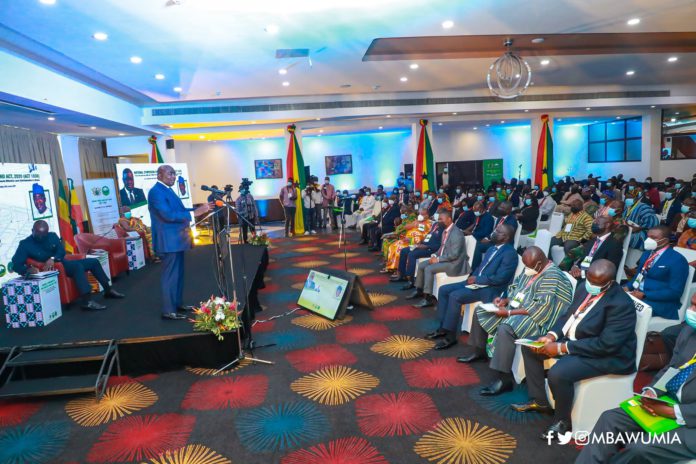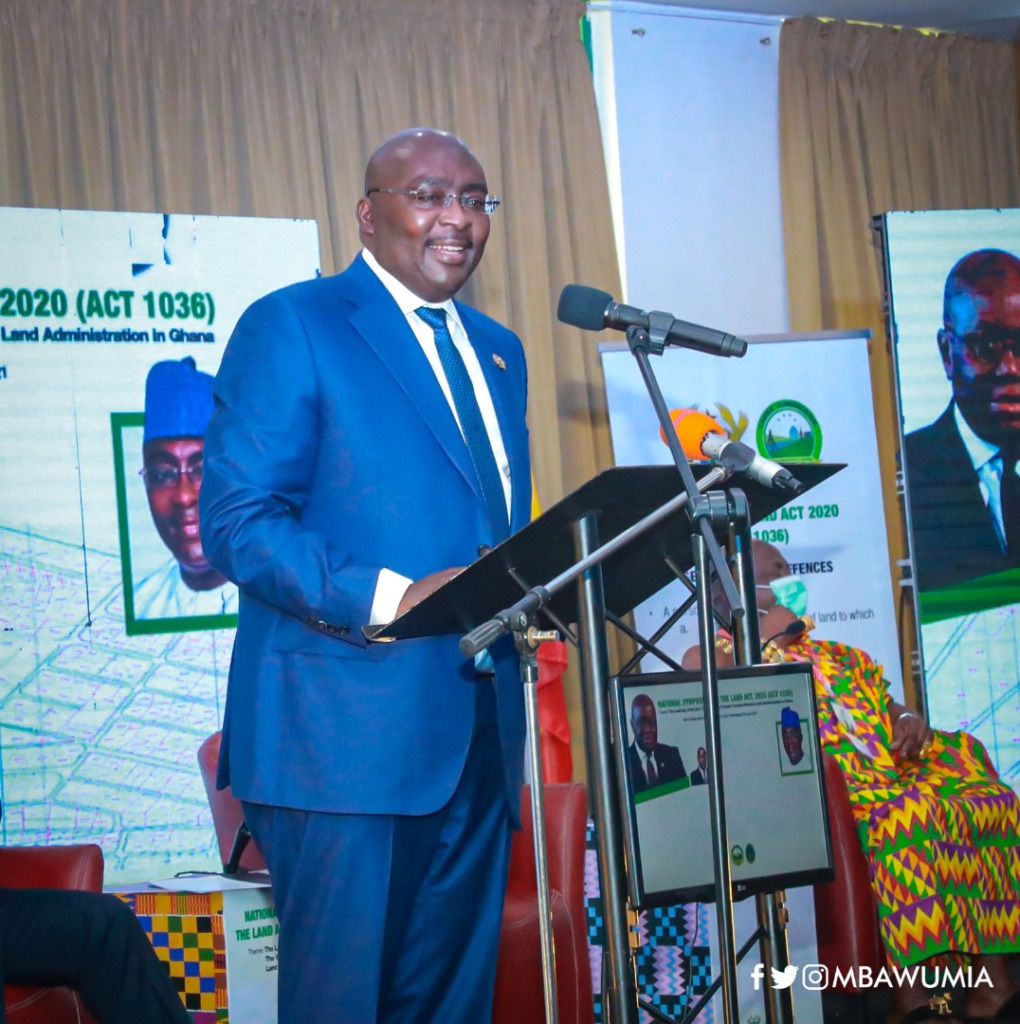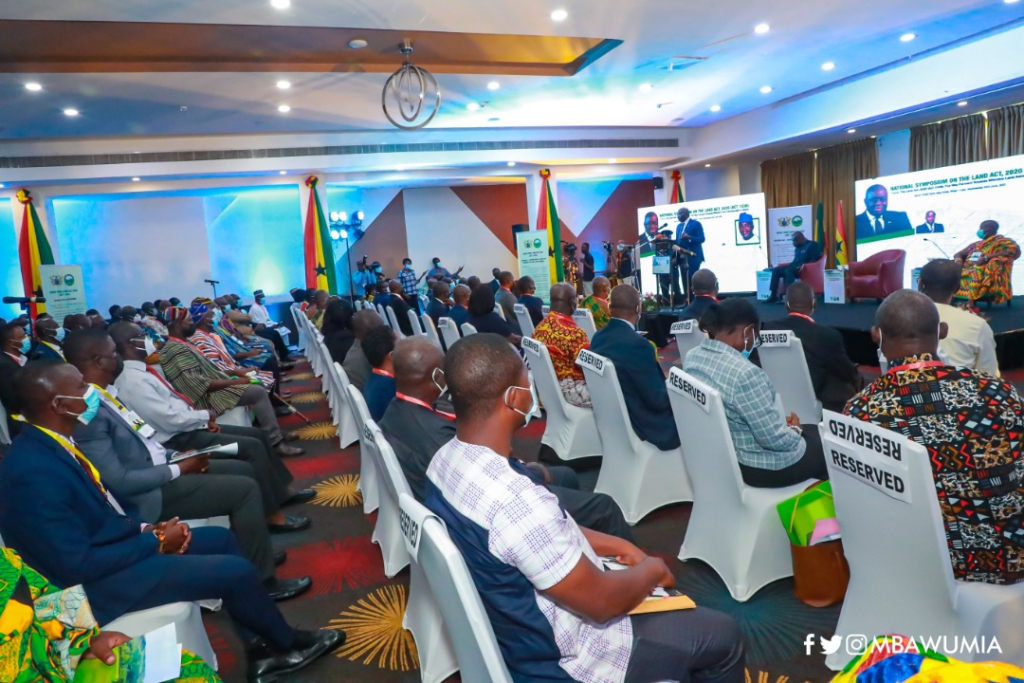
The Vice President, Dr Mahamudu Bawumia, has charged the Lands Ministry, Lands Commission and other land management agencies and traditional leaders to see to the vigorous implementation of the new Land Act 2020 (Act 1063) to ensure sanity and security in the administration of land in Ghana.
Addressing participants at a national symposium organised by the Ministry in collaboration with other land use administrators in Accra on Wednesday, Dr Bawumia expressed delight that a comprehensive document guiding the use and administration of land had finally become a reality.
“Today’s National Symposium marks a significant event in the history of land administration in Ghana. I say this because, for the first time, a Law on land administration has been passed to revise, harmonize, and consolidate laws on land to ensure sustainable land administration and management.

“The importance of an effective and efficient Land Sector in Ghana cannot be overemphasized. Every economic activity undertaken by man has a relation to land and, therefore, land remains pivotal to National Development.
“The National Lands Policy, 1999, the Coordinated Programme of Economic and Social Development Policies (2017-2024), and the Ghana Beyond Aid Strategy Document (2020) show that a functional land administration system is a catalyst for development.”
In addition to harmonizing existing laws the Act, which received Presidential Assent on 23rd December, 2020, provides for the repeal of 13 land related Acts, which in turn result in the repeal of orders/rules and regulations that emanate from these repealed laws.
Further, Act 1036 significantly introduces new provisions relating to customary land management, compulsory acquisition and vesting of lands, electronic conveyancing, and spousal land rights.
It also provides for stringent of jail terms for various offences related to land that are expected to assist in the sanitizing the land sector.
Recalling his surprise visit to the Lands Commission in 2018, during which he observed several, major challenges in the documentation and administration of land documents, Vice President Bawumia said Government re-invigorated efforts to ensure the passage of a law which embraced technology to meet the challenges of our time.

“It is worth noting that successive Governments have tried resolving the challenges in our Land Administration system, but these efforts have often come with various complications, and inefficient deployment of resources. Governments after governments, bank loans after bank loans, our fundamental problems in land administration persist, seemingly unsolvable, and citizens’ complaints get louder and louder.
“To address these critical challenges in the land sector and to optimize the contribution of land to the socio-economic development of Ghana, the Government of Nana Addo Dankwa Akufo-Addo is committed to change through the application of technology. Ghana can only make the much-needed strides in development when technology becomes the driver for all sectors of the economy.”
Dr Bawumia called on all stakeholders to actively play their parts in ensuring that the provisions of the Act become reality, and not just another piece of legislation that gathers dust.
“Laws in themselves do not resolve problems. It is the application of the laws and their effective implementation that will result in desired changes in the land sector that all of us so much desire.
“To this end, I will like to emphasize the need for all stakeholders to rally together to ensure that the provisions of the Land Act are implemented effectively, and resources are channeled towards it.
“For instance, the Land Act provides that our eminent chiefs, clan and family heads, tendanas, who are the custodians of approximately 80% of the land area of Ghana, are required to establish Customary Land Secretariats to improve the management of their lands.
“However, our Traditional Authorities will require technical and professional assistance from the Lands Commission, Office of the Administrator of Stool Lands and the Land Use and Spatial Planning Authority to establish the Secretariats. I trust the honourable Minister would give the urgent support and needed directives to the agencies to this end.”
“Also, the participation of the Private Sector is essential, especially in the injection of capital and technical know-how in targeting specific key improvements in the infrastructure and operations of the Lands Commission. This participation would go a long way in improving efficiency,” he added.






